What Customers Think About Call Center Scripts: 2014 vs. 2018
Update: We originally published this report in 2014. Over the years it’s been quite popular with buyers of call center scripting software and business phone systems, so we decided it was due for a refresh. To that end, we ran the same survey again in 2018. Below you’ll find the original report and side-by-side comparisons of survey results from 2014 and 2018.
Customers generally don’t like having to deal with customer service on the phone. In fact, one emotion they frequently and increasingly experience as a result of those interactions is rage.
But customer service departments are supposed to help customers with their problems, right? So why all the hate?
Much of it comes not from what the call center agents are saying. Rather, it’s how they’re saying it.
“It’s that kind of stiff, robotic, ‘I have been told to say this and I’m going to say it’ behavior that just makes the angry or unsatisfied or frustrated customer go off the deep end,” explains Gail Goodman, a business phone skills consultant and advisor to the call center industry.
It’s true that customer service agents are told what to say. Most call centers have scripts that the agents are trained to follow. These scripts tell the agents what to say and when to say it. But again, the problem is how they’re saying it—and that’s tied directly to the fact that they’re reading scripted responses.
Customers Prefer Unscripted Calls
First, we wanted to establish whether customers dislike speaking with call center agents who sound like they’re reading from scripts.
We were concerned that if we asked the question too directly—“Do you dislike speaking with call center agents who sound scripted?”—we’d get too many automatic “Yes” responses. Plus, we wanted the questions to focus on improvement. With these points in mind, we rephrased the question and asked:
Does it improve your call experience when the customer service agent doesn’t sound like they’re reading from a script?
In 2014, the answer was a clear “Yes.” Over two-thirds of the respondents (69 percent) said their customer service experience is improved when the agent doesn’t sound like they are reading from a script. In 2018, the answer was an even more resounding yes!
Changes in customers’ perception of the effectiveness of unscripted calls 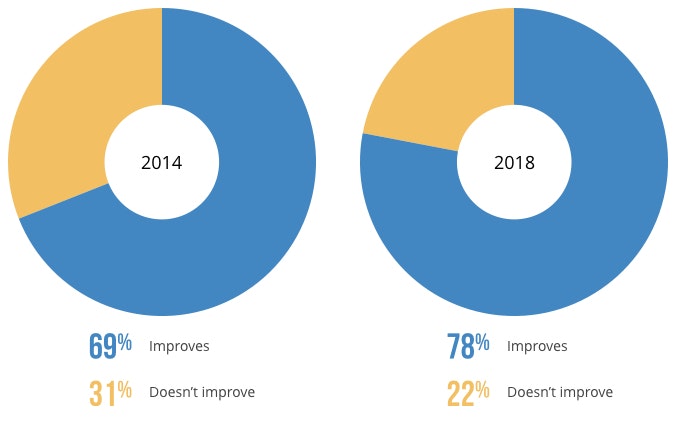
The next step was to gauge how much a customer’s call experience is improved when the agents don’t sound scripted. (After all, if call centers are going to consider changing a central component of their management and training, the incentive will need to be big.) For this we asked:
How much does it improve your experience if it doesn’t sound like the agent is reading from a script?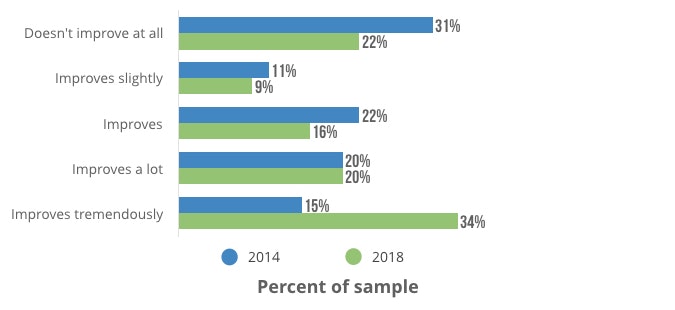
We can see that consumers in 2018, compared to consumers in 2014, are even more appreciative of natural-sounding conversations with call center agents. While this preference was already clear in 2014, it’s all the more clear today.
‘Ps and Qs’ Most Effective Sign of Empathy
Call centers operate in many different industries, but when it comes to customer service, they all have a few basic goals in common. They all want their agents to express caring, be respectful and be attentive.
To achieve these goals, they give agents certain scripted lines and tactics to follow. Customer service experts Matt Dixon and Nicholas Toman explain this practice in this detailed analysis. We asked our survey-takers how successfully call centers were using these tactics to achieve their goals. The results surprised us.
Customer service agents are trained to communicate to the customer that they care. They use lines such as, “I understand that can be very frustrating” and “I understand how that must make you feel” when dealing with angry and frustrated customers. How well does this work? We asked our survey-takers:
Which of the following make you feel like a customer service agent really cares about your call?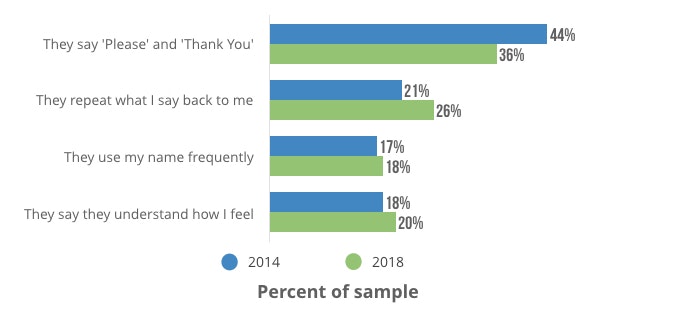
Surprisingly, claiming to understand how a customer feels—the strategy which is specifically designed to make the agent sound caring—tends to have the opposite effect. The reason for this likely has to do with inflection.
“It doesn’t matter what I script them to say—if they say it in this robotic fashion, everybody can pick up on that,” Goodman explains. “Inflection is an underrated challenge for customer service people.”
Using Customers’ Names Is Ineffective at Conveying Respect
When call center agents handle dozens of calls an hour or face angry or abusive customers, it can be difficult to sound respectful to them all. Call center scripts are often written so that the agents will sound respectful automatically, all the time. We gauged the effectiveness of this technique by asking our survey-takers:
Which of the following make you feel like the agent is treating you with respect?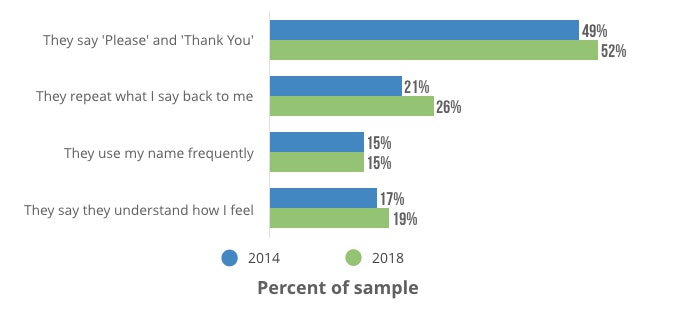
What surprised us here is that frequently using the customer’s name did not translate into a feeling of respect.
In everyday conversation, outside the context of customer service, addressing a person by name—and especially using their surname preceded by “Mrs.” or “Mr.”—is a universal way of showing respect. It adds a layer of formality to the conversation, making it clear that the speaker isn’t taking the relationship for granted.
It doesn’t, however, seem to work very well on the phone. This is likely due to inflection. When agents address people by name on the phone, they do so automatically. They sound like they’re just following a script (because they usually are), and that deflates any respect that might have been conveyed.
So why do so many scripts still require that agents repeat the caller’s name?
“Most companies will tell you it’s all about consistency,” explain Dixon and Toman. “But, let’s face it, consistency breeds robotic interactions which fail to result in a [better] customer experience.”
Mirroring Helps Agents Stay (and Sound) Attentive
Nobody wants to talk to someone who isn’t paying attention. It usually feels like a huge waste of time. This is especially true when on the phone with customer service.
Though customer service agents generally need to pay a minimum amount of attention in order to properly handle callers’ requests, the repetitive nature of the job can make it clear to callers that they’re being inattentive. We asked our respondents about which practices make them feel like their issues are being listened to:
Which of the following make a customer service agent sound attentive on the phone?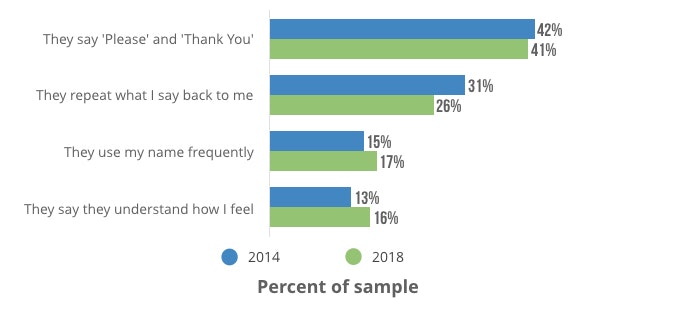
Repeating what a customer says, word for word, is a very common tactic. Referred to as “mirroring” or “reflective listening,” it not only makes the agent sound attentive, it actually makes them be attentive, as well.
This helps ensure they heard the information correctly, gives the customer a chance to hear and confirm it and also reinforces the fact that the agent is listening attentively. It scored quite well in our survey, and seems fairly effective.
Implications
Given the results of this survey, we see a few areas where call centers could make improvements.
What stands out most to us is the fact that saying “please” and “thank you” is the most effective of all the strategies, and is most effective for all three of the goals we tested. It seems a very generic and basic courtesy, yet it beat out many lines and strategies which were specifically tailored to meet certain goals and make customers feel a certain way.
So, why is simply using “please” and “thank you” so successful?
Our suspicion is that, when agents say “please” and “thank you,” they are not reading those words directly from a script. They’re saying them naturally. They fit into the dialog just like they do in normal, everyday conversation, and the inflection and tone of the words is exactly how it should be. They don’t sound robotic, and callers pick up on that. And from the data, it seems they appreciate it, too.
Conclusion
The broad goal of call center management—to improve customer interactions while maximizing the number of interactions each agent handles—requires compromise. That comes in the form of scripts and strategies to standardize customer service within the company’s guidelines and policies.
Though agents obviously can’t be given free rein to handle callers however they please, it should be recognized that there are cases where scripting strategies fail.
When the benefit of a scripted line is minimal, or when it does not outweigh the displeasure customers feel when speaking with agents who are obviously scripted, then that line should not be included in a script.
Methodology
These surveys were conducted online in April, 2014 and February, 2018. The survey included 5 questions, each of which was seen by between 500 unique respondents. The survey targeted adults in the U.S. ages 18 and over.
To further discuss this report or obtain access to any of the charts above, feel free to contact me at craig@softwareadvice.com.